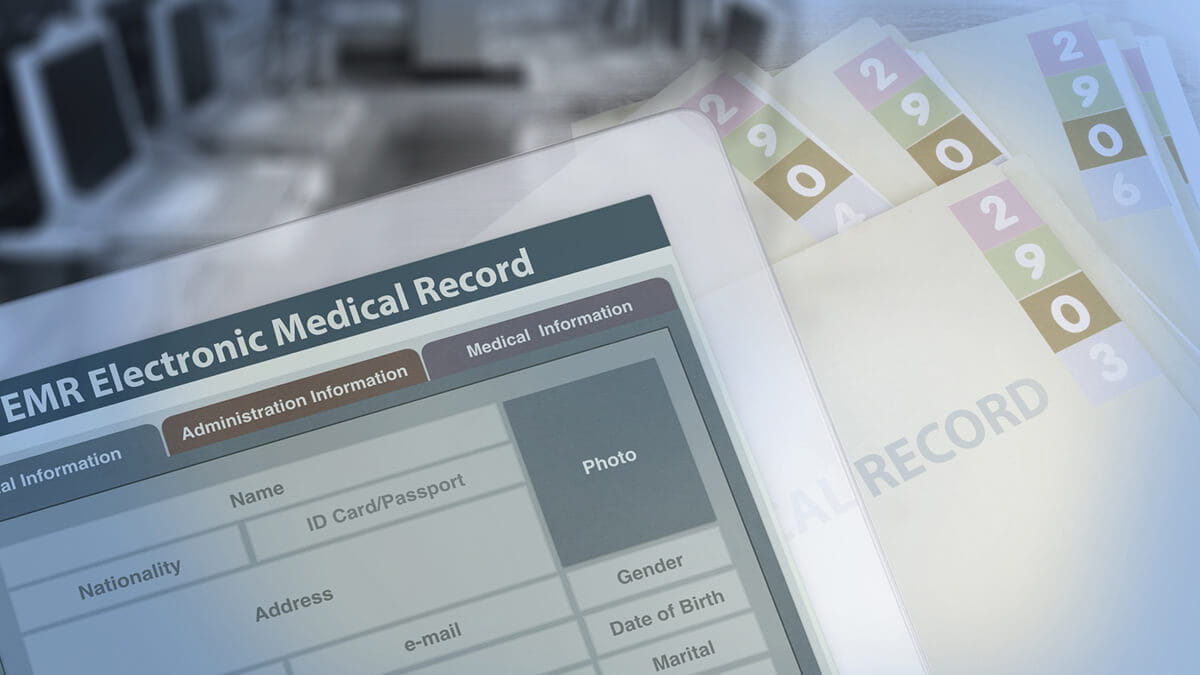Just about every hospital in the U.S. uses an electronic health records (EHR) system.1 Replacing the paper charts of yesteryear, EHRs expedite the access to and sharing of patient data and allow for data analytics (called health informatics) that promise to create new efficiencies and improve patient outcomes.
No doubt, as a nurse, you’ve heard administrators and others tout the advantages of EHRs. And it’s likely, in your career in nursing, you’ve seen some of these advantages at work. But anecdotal evidence is not enough to say EHRs are improving healthcare. For that, we need the kind of research that’s studied in advanced nursing programs, like Walden University’s Master of Science in Nursing (MSN) program.
At Walden, MSN nursing students look at some of the data behind the effectiveness of EHRs, so they can better understand how to use EHR’s in their nursing careers. For example, in the course Transforming Nursing and Healthcare through Information Technology, students study the Agency for Healthcare Research and Quality’s (AHRQ’s) document “Length of Stay,” which summarizes the research into how EHRs can help reduce the length of inpatient stays.2
Inpatient length-of-stay is a common measure of quality, with shorter stays indicating quicker recoveries and fewer complications. This makes it a good metric for evaluating the usefulness of EHRs. So, can EHRs play a valuable role in improving patient outcomes? As stated in “Length of Stay”:
Patients may experience extensions in hospitalizations due to delays in decision-making by providers while they wait for results, schedule diagnostic tests, conduct discharge planning, or wait for consultation because of inadequate access to consultants and specialists. Health IT applications that facilitate the transmission of important patient data to providers more quickly may reduce hospital stays in several ways. For example, health IT can help with the efficient and timely notification of available or critical results, or notification of when a consultant note is available.
Electronic health records (EHRs) allow providers to view a patient’s medical record electronically in real time. By doing so, providers can avoid waiting for paper charts to arrive to the hospital floor or ordering what may be duplicate tests when complete patient information is unavailable. Computerized provider order entry (CPOE) has been shown to reduce the amount of time between the placement of a given order and its execution. Tests, treatments, and medications are therefore scheduled and delivered faster. Viewing results electronically may allow for faster access to results, enabling providers to make diagnosis and treatment decisions in a timelier manner. In addition, the use of clinical decision support can lead to more effective and efficient care by recommending evidence-based treatment and medication regimens at the point of care. Finally, electronic prescribing (e-prescribing) or electronic medication administration record systems (eMAR) can alert providers to potentially dangerous doses or interactions that can decrease the incidence of preventable adverse errors that are costly and require longer lengths of stay.
EHRs are here to stay—but knowing how to make the best use of them can help you take your nursing career further. That’s why learning about EHRs is included in MSN programs. But technology isn’t the only topic you can study in a master’s in nursing program.
When you earn an MSN degree, you can gain advanced knowledge in all the major topics affecting nursing and patient care. You can also specialize in the area of nursing the interests you most. With a master’s degree in nursing, you can become a nurse practitioner, nurse educator, nurse manager, or nurse leader in other nursing fields, including health informatics.
If you want to take your nursing career further, there’s no better choice than moving from RN to MSN. And thanks to online learning, that move is more possible than you may think.
Unlike campus-based nursing schools, online nursing schools don’t require you to live near a campus. Instead, you can stay right where you are now and take your classes via the internet. And what time of day you take your classes is up to you. In an online MSN program, your schedule is flexible, meaning you can choose to attend class during the hour or hours that work best for you. It’s one of the conveniences of online education, and many who earn their master’s in nursing online use it to organize their class schedule around their full-time work schedule.
EHRs are an important part of healthcare. With an MSN degree, you can learn more about them and gain the skills you need to enhance your nursing practice.
Walden University is an accredited institution offering an Master of Science in Nursing degree program online. Expand your career options and earn your degree in a convenient, flexible format that fits your busy life.
1 Source: https://dashboard.healthit.gov/evaluations/data-briefs/non-federal-acute-care-hospital-ehr-adoption-2008-2015.php
2 Source: https://healthit.ahrq.gov/sites/default/files/docs/page/length-of-stay-quick-reference-guide.pdf
Walden University is accredited by The Higher Learning Commission, www.hlcommission.org




